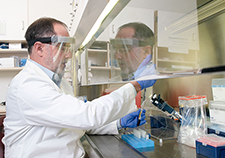Office of Research & Development |
 |
Office of Research & Development |
 |


Researchers are testing the anti-inflammatory drug baricitinib in combination with other medications to improve the condition of hospitalized COVID-19 patients. (Photo for illustrative purposes only. ©iStock/Franckreporter)
December 18, 2020
By Mike Richman
VA Research Communications
"To use an anti-inflammatory, an immune modulator, to treat infectious diseases is profound. It's a really big deal."
It was once under the radar of much of the medical community. Now, research by Dr. Vincent Marconi and Dr. Raymond Schinazi has expanded into a potentially impactful finding in the search for treatments to the COVID-19 virus.
For nearly a decade, Marconi, an infectious disease expert at the Atlanta VA Health Care System, Schinazi, an antiviral drug specialist at Emory University in Atlanta, and Dr. Christina Gavegnano, a basic scientist from Schinazi's lab, have jointly studied medications to treat HIV, a virus that attacks the body's immune system. They have focused on a class of anti-inflammatory drugs used to treat rheumatoid arthritis known as JAK inhibitors. Inflammation plays a major role in the pathology of viral infectious diseases.
Several years ago, Marconi co-chaired a study showing the ability of one of those drugs—ruxolitinib—to reduce inflammation in people with HIV. He and his colleagues then pivoted to another drug in that class—baricitinib—a few months before the COVID-19 pandemic surfaced in early 2020.

AI to Maximize Treatment for Veterans with Head and Neck Cancer

VA researcher works to improve antibiotic prescribing for Veterans

VA’s Million Veteran Program played crucial role in nation’s response to COVID-19 pandemic

VA Further Develops Its Central Biorepository: VA SHIELD
“The [ruxolitinib] study provided the first evidence in humans that this class of drugs could reduce inflammation for patients with an infectious disease,” Marconi says. “Therefore, it seemed logical that the same rationale could be applied to COVID-19, which accelerates the inflammatory process seen in chronic viral diseases, such as HIV.”
Meanwhile, Schinazi read in the British journal The Lancet that baricitinib may reduce the ability of the novel coronavirus to infect lung cells. Using artificial intelligence, British researchers had searched for approved drugs, including JAK inhibitors, that can possibly block the viral infection process. They found that baricitinib had the best profile.
The pieces were coming together. Knowing that baricitinib has advantages over ruxolitinib, including that it’s much less expensive, requires only single daily dosing, and produces fewer negative drug interactions, Marconi and Schinazi focused on the former for its COVID-19 potential. Baricitinib (trade name Olumiant) has since been the centerpiece of a study that generated positive results and prompted the U.S. Food and Drug Administration (FDA) to issue an emergency use authorization that gives hospitalized COVID-19 patients rapid access to that drug.
That development, Marconi says, may begin to fuel a “paradigm shift” in the world of medicine.
“To use an anti-inflammatory, an immune modulator, to treat infectious diseases is profound,” says Marconi, who is also a professor at Emory. “It’s a really big deal. In the past, people have been concerned and rightfully so that immune modulators can lead to infections when they’re used long term and in certain populations. Here, we’re actually using them to treat people with infections.
“Baricitinib blocks multiple pathways leading to the inflammatory response in COVID-19,” he adds. “It is not a blunt instrument like a steroid. But it delicately interrupts specific mechanisms of inflammation. Therefore, the drug is well tolerated and effective in treating the disease. Patients who have mild disease could also benefit, but we would need a very large trial to detect this difference. That’s because most of the patients with mild disease who get standard of care would never progress to moderate or severe disease.”
Schinazi, who previously worked at the Atlanta VA for more than three decades, and Marconi initially tested baricitinib in a single-arm study in the spring of 2020. They combined the drug mostly with hydrodroxychloriquine and other medications that patients were receiving at the Atlanta VA. Hydrodroxychloriquine, which suppresses a person’s immune response, has long been used to treat malaria and rheumatoid arthritis, among other conditions.
“Meanwhile, we were witnessing the devastating effects of this disease locally and internationally,” Marconi says. “None of the treatments provided any perceptible benefit. Therefore, given the safety of this drug and the supportive evidence, we decided to cautiously proceed with a controlled introduction of baricitinib off-label to patients who consented to receive it.”
In the study, 15 patients with moderate to severe COVID-19 received daily doses of baricitinib, in addition to their background treatment. The combination was linked to the recovery of 11 of the patients. Recovery was based on a normalization of body temperature and a drop in inflammatory markers and oxygen requirements. The three other patients passed away. They all had severe cases of COVID-19 when the study began and had advanced directives limiting extensive measures to keep them alive.
Marconi says the researchers cautiously interpreted the results, which appeared online in June 2020 in the journal Clinical Infectious Diseases, because the study was not randomized and placebo-controlled.
“The apparent benefits of a much more rapid recovery and in some cases impressive reversal of the patients’ clinical condition could only be compared to other [COVID-19] patients who had not received baricitinib,” he says. “A conclusion in the absence of such a comparison is fraught with biases that are inherent in single-arm studies. However, the fact that we did not see acceleration of disease gave us encouragement to proceed with a randomized controlled trial. That was what made this single-arm study successful.”
Marconi and his colleagues approached the U.S. National Institutes of Health (NIH) with findings from the single-arm study. That data, he says, influenced NIH to sponsor the randomized trial. “They were reviewing about 25 potential COVID-19 drugs at the time, but my presentation convinced them to move forward with baricitinib,” he notes. In the trial, Marconi was part of a research team that tested the combination of baricitinib and the antiviral drug remdesivir in patients with serious cases of COVID-19.
Medical experts have identified remdesivir (trade name Veklury) as a promising therapy for COVID-19. A trial published recently found that the drug shortened recovery time for hospitalized COVID-19 patients with lower respiratory tract infection. In response, the FDA issued an emergency use authorization for use of remdesivir during the pandemic.
More than 1,000 patients, including some hospitalized at the Atlanta VA and the South Texas Veterans Health Care System, took part in the NIH-sponsored multinational study. They were randomized evenly, with one group taking baricitinib and remdesivir and the other remdesivir alone.
The study found that patients receiving the combination treatment had a median recovery time of seven days, versus eight days for the remdesivir-only group. In addition, patients receiving greater oxygen support or non-invasive ventilation had a recovery time of 10 days with the combination treatment, compared to 18 with the control medication. Both were “statistically and clinically significant reductions in recovery time,” Marconi says. The researchers defined recovery as being released from the hospital with or without a limitation on activities or remaining hospitalized but no longer requiring oxygen.
In the key secondary outcome, patients taking baricitinib and remdesivir had a 30% greater improvement in clinical status at day 15 compared to the control arm, notably among non-intubated patients with severe breathing difficulties. The combination arm was also linked to a 35% lower death rate at the 28-day mark—which was even better for people requiring oxygen—and fewer serious side effects.
The results appeared in the New England Journal of Medicine in December 2020.
The study, according to the researchers, marked the first randomized, double-blind, placebo-controlled trial to demonstrate major clinical benefit from the combined treatment of an antiviral drug and an anti-inflammatory drug for adults with COVID-19. It was also the first study to show benefits by a JAK inhibitor for treating an infectious disease.
The FDA has since issued an emergency use authorization so baricitinib and remdesivir can be combined to treat hospitalized COVID-19 patients.
Marconi says the two drugs played off one another perfectly in the trial.
“To pair baricitinib with an antiviral is a winning combination,” he explains. “That’s what you want to see. You want to try to stop the virus from replicating, and then you want to prevent this sort of out-of-control inflammatory response. It’s two different angles, which gets you added benefit or maybe even synergistic benefit.”
Currently, Marconi is part of a research team that is enrolling participants for another NIH-sponsored COVID-19 randomized controlled trial involving baricitinib. This time, the effectiveness of the baricitinib-remdesivir combination will be compared to the steroid dexamethasone (trade name Decadron) and remdesivir. Steroids provide relief for inflamed areas of the body and have been shown to benefit COVID-19 patients.
It’s unclear at this time how many VA sites beyond the Atlanta VA will participate.
A recent British study showed that in hospitalized COVID-19 patients, dexamethasone resulted in lower 28-day death rates among those receiving invasive mechanical ventilation or oxygen at randomization, but not among people with no respiratory support.
Essentially, the two randomized controlled trials involving baricitinib are parallel studies. Marconi and his colleagues are trying to determine which drug combination leads to a shorter recovery time and lower death rates.
“These are platform trials where we can do a couple of things,” says Marconi, who also serves on the COVID-19 steering committee in VA’s Office of Research and Development. “One is to test out treatments that have never been looked at before in this setting. We can also compare two really good drugs [baricitinib and dexamethasone] and find out if one is better than the other. Sometimes, you can even do a combination of the two. That’s something we’re exploring for future trials.
“It may turn out that both dexamethasone and baricitinib work really well,” he adds. “But it’s likely that people will still be dying. We may need to combine these two drugs or alter the doses. This is a first step on a pathway to learning how to best manage this health challenge and save the lives of patients with severe cases of COVID-19.”
VA Research Currents archives || Sign up for VA Research updates